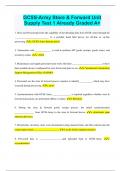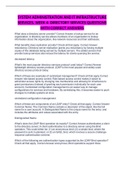Summary
Law of Succession in South Africa - Full Summary and Notes
- Course
- Institution
- Book
Law of Succession in South Africa - includes clear and concise notes in bullet point format, easy to read and with relevant authority. Includes lecture notes, full summary of Law of Succession in SA by Juanita Jamneck, case summaries and exam prep.
[Show more]





